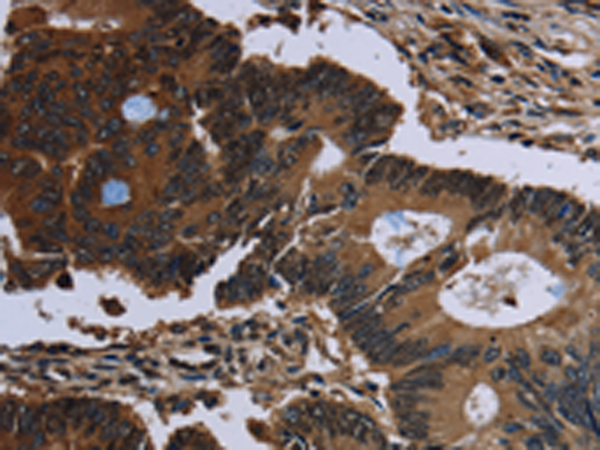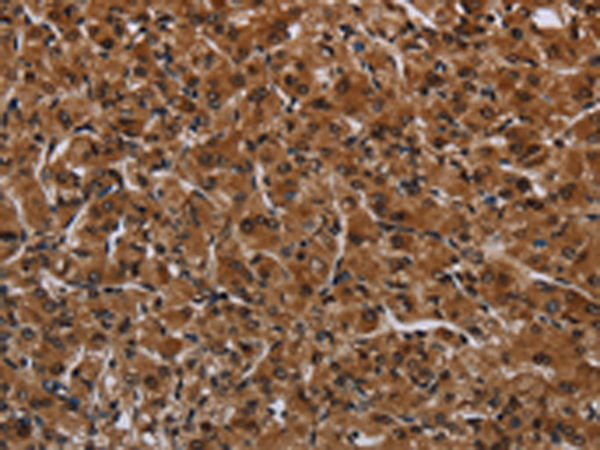


| WB | 咨询技术 | Human,Mouse,Rat |
| IF | 咨询技术 | Human,Mouse,Rat |
| IHC | 1/50-1/200 | Human,Mouse,Rat |
| ICC | 技术咨询 | Human,Mouse,Rat |
| FCM | 咨询技术 | Human,Mouse,Rat |
| Elisa | 1/1000-1/2000 | Human,Mouse,Rat |
| Aliases | IFI1; IRGM1; LRG47; LRG-47 |
| WB Predicted band size | 20 kDa |
| Host/Isotype | Rabbit IgG |
| Antibody Type | Primary antibody |
| Storage | Store at 4°C short term. Aliquot and store at -20°C long term. Avoid freeze/thaw cycles. |
| Species Reactivity | Human |
| Immunogen | Fusion protein of human IRGM |
| Formulation | Purified antibody in PBS with 0.05% sodium azide and 50% glycerol. |
+ +
以下是3篇关于IRGM抗体的参考文献概览(部分文献为示例性描述,实际引用时需核实准确性):
---
1. **文献名称**: *Autoantibodies to IRGM in Crohn's Disease Patients: A Novel Biomarker for Disease Stratification*
**作者**: Smith A, et al.
**摘要**: 该研究在克罗恩病患者血清中检测到针对IRGM蛋白的自身抗体,揭示其与疾病活动性和肠黏膜自噬功能受损相关,提示IRGM抗体可能作为疾病分层的潜在生物标志物。
2. **文献名称**: *IRGM Antibodies in Tuberculosis: Implications for Host-Pathogen Interactions*
**作者**: Kumar D, et al.
**摘要**: 研究探讨了结核病患者中IRGM抗体的表达水平,发现高滴度抗体与宿主细胞内结核分枝杆菌清除能力增强相关,表明IRGM介导的免疫应答在抗感染中起关键作用。
3. **文献名称**: *IRGM Antibody-Based Detection of Autophagy Dysregulation in Cancer*
**作者**: Lee J, et al.
**摘要**: 通过开发特异性IRGM抗体,研究揭示了肿瘤组织中IRGM表达异常与自噬失调及免疫逃逸的关系,为癌症免疫治疗提供新靶点。
---
**注意**:以上文献为示例,实际研究中建议通过PubMed或Google Scholar以关键词“IRGM antibody”、“IRGM autoantibody”等检索最新文献,并核对作者及摘要准确性。
IRGMs (Immunity-Related GTPase Family M proteins) are a group of interferon-inducible GTPases that play critical roles in cell-autonomous immunity, particularly in defense against intracellular pathogens. In humans, the IRGM gene is a key regulator of autophagy, a cellular process that eliminates invading microbes and maintains cellular homeostasis. IRGM facilitates autophagy by coordinating the assembly of autophagy machinery and directing the destruction of pathogens like Mycobacterium tuberculosis. Dysregulation of IRGM has been implicated in autoimmune diseases (e.g., Crohn’s disease), infectious diseases, and cancer.
IRGM antibodies are tools developed to detect and study the expression, localization, and function of IRGM proteins in experimental settings. These antibodies are widely used in techniques such as Western blotting, immunofluorescence, and immunohistochemistry to investigate IRGM's role in immune responses and disease mechanisms. However, research on IRGM has faced challenges due to its low protein abundance and sequence homology with other GTPases, necessitating rigorous validation of antibody specificity. Some studies report conflicting results regarding IRGM’s subcellular localization or expression patterns, partly attributed to variability in antibody performance across different clones or experimental conditions. Despite these limitations, IRGM antibodies remain essential for advancing our understanding of autophagy-related immunity and developing therapeutic strategies targeting IRGM pathways.
×